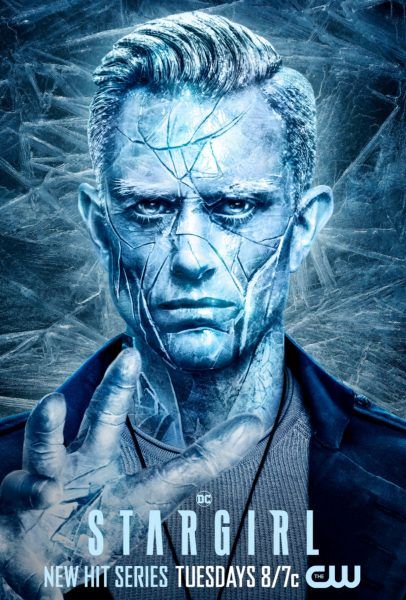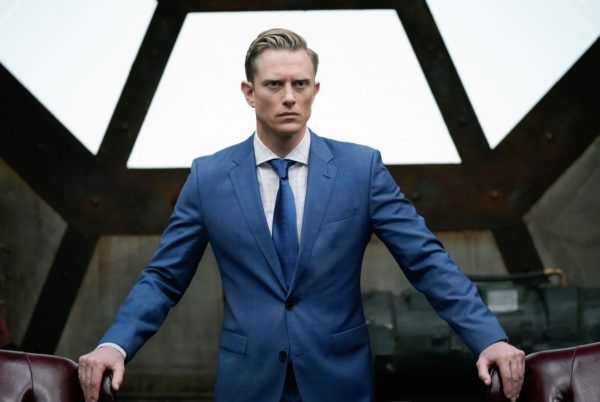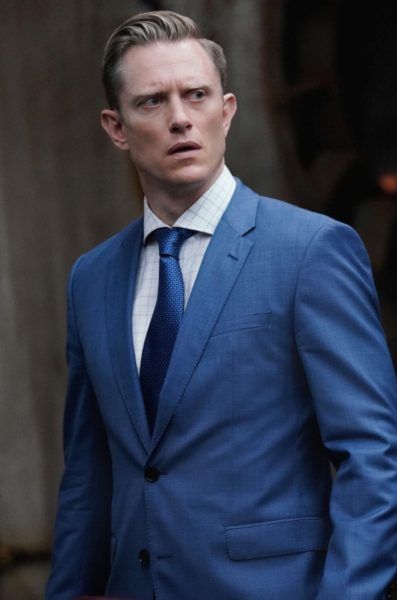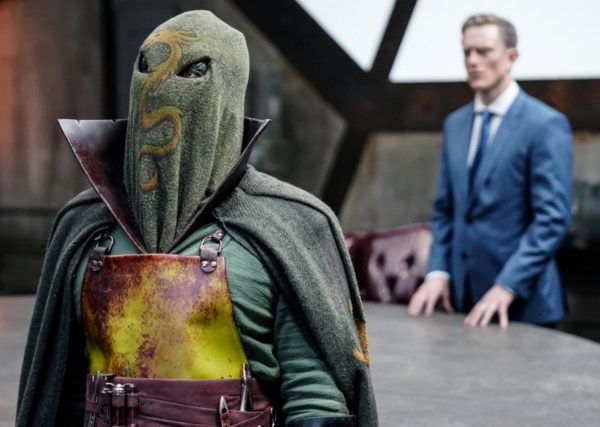In the next episode of The CW series Stargirl, entitled “Brainwave,” things are heating up for the new Justice Society members, led by Courtney (Brec Bassinger), as the Injustice Society is still laying the groundwork for their big plan. And while supervillains are living right in the unsuspecting small town of Blue Valley, until their identities are uncovered, the superheroes will be in danger.
During this 1-on-1 phone interview with Collider, actor Neil Jackson talked about the fun of getting to play the duality of Jordan Mahkent and the supervillain Icicle, what makes Stargirl such a special TV series, the hope that viewers will understand his character’s motivations, becoming a part of the Arrow-verse and why he thinks this show can establish its own universe of spin-offs, how Jordan views the residents of Blue Valley, the family dynamic, his favorite character in the series, and what he thinks of the full Icicle look.
*Be aware that spoilers for the series are discussed*
Collider: What makes playing a supervillain in a superhero story different from playing any other type of character?
NEIL JACKSON: Well, the obvious is the superpowers. That’s the thing, we get to play in a really interesting sandbox that’s unencumbered by anything. The breadth of your imagination and budget is the only restraint, on something like this. We were really incredibly lucky, with this one. This was the most expensive pilot I’ve ever shot, and it was one of most expensive shows I’ve ever been a part of. Most shows take eight days to shoot an episode. We had 10 days to shoot an episode, and by the end of the series, we had 12 days to shoot an episode. We just had more time and more money to really devote to these characters and to tell the story in the way that we wanted to tell it, which was awesome. But playing a supervillain, for me, after the superpowers, it all comes down to character and who they are, and human beings are human beings. I went straight from Stargirl to shooting Season 3 of Absentia, which is a very different tone of show, that’s very dark, very brooding, and very much about the characters. But at their heart, they’re still people dealing with love and loss and pain and sacrifice, and all those things. So, for me, it’s always about tapping into the human truth behind all of the characters and playing them as authentically as possible, whether they shoot icicles from their fingers or they’re dealing with the death of a loved one.
Because there is a duality to this character, do you always think about that duality, or do you think about the human and the superhuman sides to him differently?
JACKSON: It was always completely interlinked. One of the things that me and Geoff Johns, the creator of the show, talked a lot about was that he can turn his skin to ice and freeze everything around him, so the natural color palette for the character was silver and blue, but I said that we should take that color palette as an extension, emotionally, as well. He’s a man who is on a very, very relatable mission and he’s trying to reform society for the better, as a result of this tragic thing that happened to him when his wife dying, and so he set up the Injustice Society to prevent other people from having the same injustice that happened to him. In many ways, he believes himself to be the hero of the piece. It would be very easy to play him as rage filled and vitriolic, but it was more interesting to lean into the blues of it. He’s a man who’s just got a deep, deep, deep sadness, and that sadness underpins everything. First of all, he lost the woman he loved, which was tragic. Second of all, he doesn’t really want to do this. He believes that he’s the only person who has the strength and the volition to make the hard decisions to enact this plan that he believes is ultimately for the best of mankind. But really, he doesn’t want that to be that case. He wishes society just worked without his intervention. So, putting this swath of sadness underneath everything really humanized and grounded him, and it led into the fact that he’s cold. He can be incredibly cold and calculating, as the human, and then the literal metaphor is that he’s incredibly cold and calculating when he turns himself twice. The two are very much extensions of each other. When he can achieve something through the boardroom and through business means, he steps into the alter ego, which can take things to a different level and achieve things in a more brutal way.
He clearly does some bad things. By the end of the season, do you feel like we’ll have learned enough about his background, his history, and the motivations for why he’s doing what he’s doing? Do you think it will help viewers feel differently about him or at least understand him a little bit more, even though he’s doing horrible things?
JACKSON: That’s my hope. My hope is that you’ll have learned enough about who Jordan is and who Icicle is, and why he’s become Icicle, that you’ll be conflicted. Obviously, from the get-go, he’s set up as being this big over-arching villain that Stargirl and the Justice Society of America are gonna have to deal with, but once you start to empathize with the villain, that makes for really interesting drama for me. If you can understand and empathize with who he is, what his means are, and what he’s trying to achieve, he’s not all that bad. What he’s trying to do doesn’t sound that bad. It sounds like he’s trying to do something that all of us would like to have happen, and that’s eradicate the nefarious reach of some of these large companies, who are manipulating everybody into being more selfish and more self-serving. He wants to create that Norman Rockwell ideal of America that has communities and apple pie, and all of those things that we talk about. So, it’s not a bad idea, it’s just that he’s willing to sacrifice other people, as collateral damage. One of the things that me and Geoff talked about, as a touchstone for this, was Thanos from the Marvel series and Avengers. He’s a guy who firmly believed that all life on Earth is doomed because of overpopulation, and that if you could indiscriminately eradicate 50% of the population of all life, then the rest of the life will thrive far better, as a result of that moment. That’s an incredibly hard decision, but he knows and believes. in his heart. that this one “evil” is ultimately for the greater good. In many ways, that’s what Jordan believes, as well. He’s a very easy character for me to relate to, and I really hope that audiences end up becoming conflicted because they end up emphasizing and understanding who he is, and therefore, in part, are rooting for him to succeed.
When this project came your way, was it very secretive, or were you told a fair bit about what the show was and who the character was?
JACKSON: I’m really lucky, I’ve been friends with Geoff Jones, who created the show, for 15 years. We shot a TV series together, 15 years ago, where he was a writer on it, so I’ve known him for awhile. He gave me a call in January 2019 and just said, “We’re making a live-action version of Stargirl,” and I knew a little bit about Stargirl. I knew it was a real passion project for him, and that he wrote it after the death of his sister in a plane crash. He said, “We’re making it for DC Universe, the streaming service, and I want you to play Jordan Mahkent. I knew nothing about the character, so he started pitching me the character, and he got half-way through pitching and I was like, “I’m in. It sounds phenomenal. It sounds like the kind of character that I love to play.” Hero or villain doesn’t matter to me. I just want somebody who is emotionally driven and complex, and that’s exactly what this person is.
This show has evolved from a DC Universe streaming show to now airing on The CW, and it’s even become a part of the Arrow-verse. How cool and fun is it to be a part of that whole DC-TV world that’s been created?
JACKSON: First of all, it’s really exciting. We didn’t know, while we were shooting, that any of that was going to happen. That was an announcement that happened afterwards. Obviously, it’s a broader reach, so more eyeballs will get to see it and more people will get to appreciate the work that’s been done, that Geoff and everybody else have put in. And then, the template is already in place. With the Arrow-verse being there and being so successful, with all of the spin-offs and other shows, that’s wildly exciting. But my caveat on that is, I think Stargirl exists within its own entity, tonally, stylistically, and also budget wise. We’re a different show, entirely, to the other stuff that has existed in the Arrow-verse. I’m very excited to be a part of the Arrow-verse and link in and out, as need be, and greater brains than mine will figure out how to do that. But there’s also huge potential for spin-offs from Stargirl. Within the Justice Society, there are all of these incredible heroes that dance all the way through the DC Universe. It’s the same with the Injustice Society. When Geoff was first pitching the show to me and he told me that Solomon Grundy was going to be part of the show, I did a little jump for joy because Solomon Grundy is just an amazing character. He’s this Hulk-like zombie that is so fun in our show. He really comes into his own, towards the end of the series, and in Season 2, he’s going to be a bigger part of the show. There are so many characters and so many stories that they can spin-off from this that we can form our own universe, which will be the Stargirl-verse. We’ll be interlinked, but also separate from what has already been in place.
The first person that we saw your character kill was a child. Was that something that you found difficult to understand?
JACKSON: All of it made sense to me. One of the things that I don’t think any actor should do is to judge their character. When he found out that his wife died, as a result of the toxic waste that was in the land that she was working on, and that it was dumped there by a pharma company and it wasn’t her fault, and they covered it up, suddenly he had this mission. His mission was to make sure that these people don’t get to do the same to anybody else, and it’s a mission that’s bigger than any one person. It’s even bigger than him. He has his team, the Injustice Society, around him, but all of them are there specifically to make sure that this mission happens. He firmly believes in what he’s trying to achieve. And so, that excludes anybody from being free from that. When someone steps out of line and challenges him, it’s not a point of ego for Jordan, to put them back in his place. It’s more about how he needs to make sure that loose ends tied up, so that there is no threat to the over-arching course. And in that regard, he sees himself as a soldier. There is always going to be collateral damage in was and, of course, we mourn for the idea of any civilian innocent lost. Jordan, in this case, had to step back from that myopic viewpoint and look at things on the macro. As a result, he has to be a little cold in his decisions, for the over-arching good.
Jordan seems like a guy who’s bigger than the town that he lives in. How does hew view this town that he’s in, and how does the town view him?
JACKSON: That’s a really interesting question. I think he views the town as guinea pigs. He views the town as a very wholesome place that already has many of the values that he wants to instill, but he also sees it as a small petri dish, where he gets to micro test his plan, before he gradually expands it to a statewide, national, and then ultimately global level. He’s using the people within that town as a yardstick and a trial, for what he’s hoping to achieve. The people in the town see him as something of a savior. He’s somebody who’s come in and found this dilapidated town that has definitely seen better days, and he’s injected a huge amount of capital into it and rebuild the town to become this flourishing place, not only for business, but for lives and for families, in this community centric approach. So, the people of the town very much see him as this white knight savior that’s coming to help them. They don’t realize that the reason he’s helping them is to enact a larger plan, and they’re, in many ways, pawns who are a part of that plan. But that’s not important to Jordan, because he’s trying to make that small town the best it can possibly be. And then, once that template works, he will expand it to a statewide and national level.
How would you describe his relationship with his son, Cameron?
JACKSON: Complex. He loves his son, desperately. Ultimately, he’s doing all of this so that his son can inherit a better world than the one that maybe he would have had, otherwise. But all of that comes at a huge sacrifice. He’s never around. He’s always away on business. He’s always taking flights and traveling, and making sure that the mission is the primary focus, not his family. So, his son is raised by his grandparents. Jordan’s parents raised Cameron, and he doesn’t have the closest relationship. The heartbreaking thing within that is that he doesn’t know how to have a close relationship because every time he looks at his son, he sees his wife, and it brings on all of the emotion and pain, of the loss of her. So, it’s not the best relationship, but ultimately, he believes that he’s being the best father he can be, by doing all of these things, so that Cameron gets a better world.
At the same time, it also seems like having Barbara working for him is not going to turn out well, for one reason or another. What can you say about how that dynamic will evolve and what his interest is in her?
JACKSON: She’s a ray of sunshine. Jordan, for nine years, has been very tunnel-visioned about his plan. He hasn’t lifted his head up to take any time to actually have happiness and joy in his life. In many ways, pun intended, he’s frozen out that aspect of who he is, so that he doesn’t have joy and fun in his life. And then, in skips this wonderful, radiant, beautiful, charming woman, played perfectly and effortlessly by Amy [Smart], and he’s captivated. It causes him to stop, for a second, and re-evaluate what his mission is. The heartbreaking for him is that he does develop feelings for her, but his main focus is family and community, so he would never want to be a homewrecker. He would never want to destroy her relationship or her marriage. They’re doomed, from the start, but the beauty is in watching the two of them develop this unlikely relationship, until they find out the history. It’s a really beautiful complex one. I really like it.
How does Jordan feel about finding out that his life and his plan is being disrupted by someone who’s using Starman’s staff?
JACKSON: He vastly underestimates this girl going around, at the beginning. He doesn’t really see her as a threat. In many ways, she’s a ball of yarn, and he’s a cat. He views her as insignificant, which is the biggest downfall. By underestimating her, he allows her to grow powerful. And then, by the time she becomes a credible threat, he didn’t expect that she would become that, so he’s derailed by it. From the beginning, he just doesn’t regard her as anything that he needs to seriously worry about.
The coolest thing about getting to play a character like this is that he does have a very cool look, when he’s in full supervillain mode. What did you think of the final look for him? How was it to see yourself like that, for the first time?
JACKSON: It was amazing. They sent me concept art of his head and what he would look like, and they’d done concept art based upon the image of me, and it was really fun to see that. The thing that we really worked on was the outfit that he wears. Everybody wanted to do as much of a nod to the comics as possible. In the comics, he’s this Jack Frost impish character who wears leotard onesies. There’s another iteration, where he’s in combat with a bulletproof vest. Some of the initial ideas for the costumer were real nods to that. There was even one version that was a silver snakeskin tracksuit that he would put on. When we talked to Geoff, we said, “Why does he become Icicle? What’s the reason that he stepped into the role of Icicle? And the reason he steps into the role of Icicle is that, when diplomacy and business fail, he becomes a soldier and he goes to war, and Icicle is him, on the front lines. So, the costume needed to echo those things. We put him in combat boots and gave him practical stuff that allows him to move freely, and within there, they slowly developed this amazing costume for him that is incredibly practical. The costumer, Emily Gunshor, put this great little addition in there, which was this key around his neck. It’s a very important symbol for him that gets partially explained in the season, but will take more of a place in Season 2, Season 3, and beyond. It was really fun to actually be hands on with that, and bounce emails back and forth, and have discussions with Emily and Geoff, until we all came up with an image for him that we liked. When Kevin [Struckman], who’s the head of visual effects, came up to me and he showed me just five seconds of Episode 1, when they’d done the full rendering of Icicle’s look in full ice, for the first time, it put a big grin on my face. He looks amazing.
Stargirl airs on Tuesday nights on The CW.





